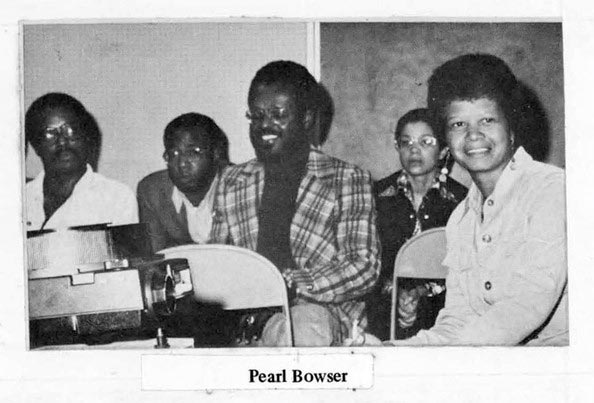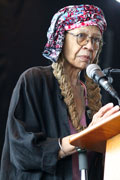Obituary
Pearl Bowser: 1931–2023

Many Generations Mourn the Loss of the Great Pearl Bowser
I remember Pearl Bowser’s name being often spoken in the offices of William Greaves Productions. It could have been about filmmaker panels, film distribution, or articles, Pearl would sometimes visit with much good humor and was generous with her time and resources.
We mourn the loss of Pearl Bowser, a tremendous figure in Black independent film, researching, chronicling, exhibiting, and promoting. A celebrated film scholar, author, archivist, educator, activist, filmmaker, and independent distributor, Pearl Bowser was a stalwart champion of independent film and filmmakers of color until her passing last month at the age of 92. She has spent her multifaceted career collaborating with other filmmakers and scholars and cultivating audiences for marginalized voices in motion pictures.
Pearl Bowser has been rightfully honored as the “Godmother of Black Independent Cinema,” the pioneer who brought the work and life of trailblazing filmmaker Oscar Micheaux and other Black filmmakers to the public eye. Since the early 1970s, she organized and curated many landmark exhibitions and programs featuring Black films and filmmakers, igniting a new wave of enduring interest in exhibiting, producing, and engaging with African-American cinema beyond borders.
Alongside Madeline Anderson, Program Director of International Films Seminars, Inc. (aka The Flaherty) and Coordinator Barbara van Dyke, Pearl Bowser organized the Seminar for Black and Third World Filmmakers in 1975, a historic gathering of filmmakers of color in New York City to share their works with each other. In her opening remarks, Madeline Anderson stated: “I hope these few days together will help Black and Third World filmmakers to become acquainted with each other’s work. We need to expand our knowledge of our history and tradition as filmmakers so that we can begin to build a body of critical analysis of our own work and put our past and present as filmmakers into perspective.”
Bowser worked closely with The Flaherty for over fifteen years, as President (1986-1989) and as programmer of the groundbreaking 35th Flaherty Film Seminar 1989. From Patricia R. Zimmermann (rest in peace) and Scott MacDonald’s The Flaherty: Decades in the Cause of Independent Cinema (2017):
In 1989, Pearl Bowser and Grant Munro mounted a seminar with an explicit focus on Third Cinema (African, African American, African diaspora, Asian American, and Latin American work) that signaled an important intervention into the mostly white, male, and East Coast North American Flaherty seminars of decades past.
This seminar featured the works of American filmmakers of color who were to become important figures in independent film history: Ayoka Chenzira, Julie Dash, Henry Hampton, Louis Massiah, Jacqueline Shearer, and Orlando Bagwell (with episodes of the monumental PBS multipart series on the civil rights movement, Eyes on the Prize); Philip Mallory Jones, and Trinh T. Minh-ha. Lynne Sachs, a white feminist filmmaker, showed Sermons and Sacred Pictures (1989). For the first time in the seminar’s history, the programming featured many works from Africa and Latin America, including Olley Maruma (Zimbabwe), Check Oumar Sissoko (Mali), Gaston Kaboré (Burkina Faso), and Oliver Schmitz (South Africa). John Akomfrah and Pratibha Parmar also attended.
As Bowser explained, “The seminar’s theme of third world cultures and histories attracted African and African diaspora filmmakers, programmers, and educators in record numbers (perhaps the largest gathering at a Flaherty Seminar any of us could remember).” This seminar was exceptional and significant in the history of the seminar. Its programming created a platform for producers of color and for discussions about racial identities and politics across Africa, the Caribbean, England, France, Latin America, and the United States. (p. 156)
Louis Massiah worked on Eyes on the Prize and founded the Scribe Video Center in Philadelphia. For him, this seminar ushered in a necessary change to the Flaherty. The questions of race had been simmering at the Flaherty Seminar for over a decade. Massiah contended that the two “most positive transformative agents in the recent history of Flaherty have been Pearl Bowser and B. Ruby Rich.” He argued that Pearl Bowser organized filmmakers of color to “share in the seminar’s critique and expand the discourse” in order to work for diversity in discussions, governance, and programming that would add “creative synergy” to IFS as a media arts organization and the Flaherty as a retreat to refuel those in the independent media sectors. (p. 158)
While accomplishing all this, Bowser was also the director of the Theater Project at Third World Newsreel, went on to direct her own film, Midnight Ramble (1994), founded Chamba Educational Film Services, a distribution company, and African Diaspora Images, a visual and oral history collection of African-American filmmaking.
Pearl Bowser will long be remembered for her persistence in forging connections and collaborations beyond the dominant imaginations of her time.
References:
Patricia R. Zimmermann (rest in peace) and Scott MacDonald, The Flaherty: Decades in the Cause of Independent Cinema (2017)
Special Program: Tribute to Pearl Bowser (Film at Lincoln Center, 2022)
Third World Newsreel Mourns the Recent Passing of Pearl Bowser (1931–2023)
Pearl Bowser leading a session at the Seminar for Black and Third World Filmmakers photographed by Jennie Bourne. October 25 1975.



